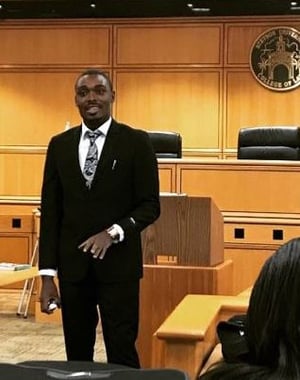By Nathaniel Ovabor, LL.M. in International Law
 A Nigerian proverb says “what a farmer says on his way to the farm is often different from what he says on his way back from the farm.”
A Nigerian proverb says “what a farmer says on his way to the farm is often different from what he says on his way back from the farm.”
Studying law as an LL.M. student in the United States has in no small measure given me the opportunity to view the legal profession from another perspective. One class that reshaped my thoughts about the practice of the law was Professor Ann Piccard’s U.S Legal Research and Writing, which I had this past fall semester.
On research, Professor Piccard reminded us that legal research is different from research in other fields. People in most fields decide what to write about before researching materials that would support their position, but the legal professionals do the opposite; they research an issue and then take a position based on their research. In other words, the research determines what argument may be made rather than the argument determining what research is to be conducted.
The arduous journey of legal research showed me how much of a litigious country I was in. The more cases I stumbled into, the more I began to think that Americans can sue and be sued at the drop of a hat; there was a case filed by a litigant on behalf of a group of orcas, Tilkum ex rel. People for the Ethical Treatment of Animal v. Sea World Parks & Entertainment, Inc., 842 F. Supp. 2d 1259 (S.D. Calif. 2012); another involving a talking cat whose owner tried to convince the court that the cat had a constitutional right to freedom of speech as guaranteed by the first amendment, Miles v. City Council of Augusta, Ga., 551 F. Supp. 349 (S.D. Ga. 1982); and another case from a man in Nebraska who sued God for directly and proximately causing, inter alia floods, hurricane and plagues. To this last complainant, God, the defendant being omnipresent is subject to the jurisdiction of that court and personally present in the county. However, the case was rejected because according to the judge, the Almighty did not have a recorded address. As I pondered on the somewhat preposterous arguments of some of the U.S attorneys, the words of Addison Mizner came to mind, “where there is a will, there is a lawsuit.”

The writing portion of the class introduced us to some helpful memory aids for legal writing and oral argument. We were taught to arrange our arguments using CREAC (Conclusion, Rules, Explanation, Application and Conclusion), PASS (Purpose, Audience, Scope and Stance), and the 3 Cs (Clear? Concise? and Correct?). I also learned how to employ syllogisms during legal writing to arrive at a logical conclusion based on two or more propositions. For example, a lawyer could logically say, the U. S Constitution guarantees the right to life of U.S citizens (major premise), Megan is a U.S citizen (minor premise), therefore, the Constitution guarantees Megan’s right to life (conclusion). I applied these lessons not just in writing but also in the oral argument, which was part of the final assessment.
Finally, the U.S Legal Research and Writing class was a very important class for me as a foreign attorney studying the rudiments of American law. It gave me invaluable knowledge and skills in writing, research and advocacy which I utilize confidently in other classes and in my In-House Counsel externship at Duke Energy. If not for anything else, I write more confidently now than ever. Even as I write this descriptive essay, I strive to meet the goals of Professor Piccard’s 3Cs. I strive to be clear, I strive to be concise and I strive to be correct.
Topics: Articles

.jpg)

